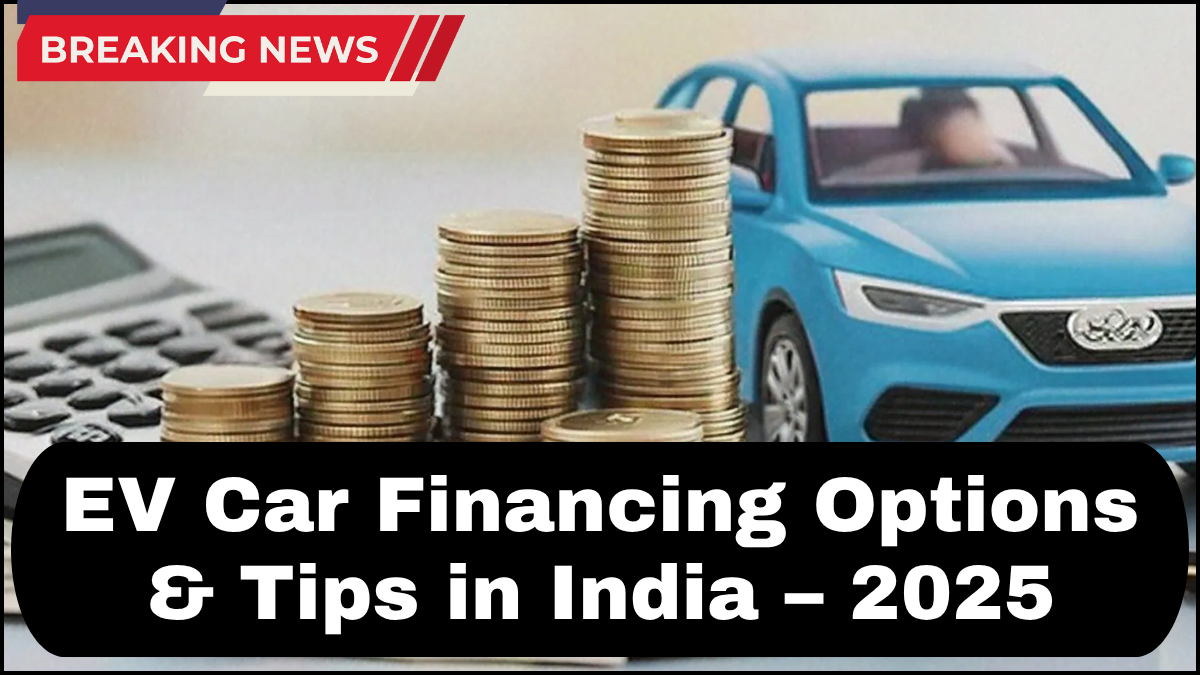As India accelerates toward cleaner mobility, electric vehicles (EVs) have shifted from a niche to a mainstream choice. While EVs promise lower running costs and environmental benefits, the upfront purchase cost remains a hurdle. Thankfully, several financing options now make EV ownership more accessible. Here’s everything you need to know about how to finance an EV car in India in 2025, from loan options to eligibility criteria and expert tips.

Understanding EV Car Loan Options in India
Banks, NBFCs (Non-Banking Financial Companies), and even EV manufacturers now offer tailored loan schemes to support EV adoption. Here’s a breakdown of common options:
1. Traditional Auto Loans for EVs
Most major Indian banks have extended their auto loan offerings to cover electric vehicles. These loans typically cover up to 90-100% of the on-road price, depending on the borrower’s credit profile.
- Tenure: 1 to 7 years
- Interest Rates: Generally range from 8.50% to 10.50%, often lower than petrol/diesel vehicle loans
- Processing Fees: Around 0.5% to 1% of the loan amount
2. EV-Specific Loan Schemes
Certain institutions have rolled out green loan programs exclusively for EV buyers. These come with flexible repayment options, lower interest rates, and faster processing.
For example:
- SBI Green Car Loan offers a concessional rate of interest and longer repayment tenure.
- Axis Bank’s EV Loan gives up to 100% financing with extended tenure options.
3. OEM-Partnered Finance Deals
EV manufacturers like Tata Motors, MG, and Mahindra collaborate with banks and NBFCs to offer customized financing schemes. These packages often include:
- Minimal down payment
- Special interest rates
- Easy EMI plans
- Bundle deals (like vehicle + home charger financing)
4. Government Schemes and Subsidies
While not a direct financing method, central and state government subsidies under schemes like FAME II and state EV policies reduce the on-road cost, indirectly making loans smaller and more manageable.
EV Loan Eligibility Criteria
Loan eligibility is a critical part of understanding how to finance an EV car in India. Here are typical eligibility factors:
- Age: 21 to 65 years
- Income: Minimum monthly income of ₹20,000 (varies by lender)
- Employment Type: Salaried or self-employed individuals/business owners
- Credit Score: 700+ is ideal for better rates and approval
- Loan-to-Value Ratio (LTV): Most lenders offer up to 90%-100% of the vehicle’s value
Tips to Maximize EV Financing Benefits
1. Compare Loan Offers Thoroughly
Don’t settle for the first quote. Use online loan aggregators or visit multiple bank branches to compare interest rates, processing fees, and prepayment penalties.
2. Consider TCO, Not Just EMI
EVs may have a higher EMI but lower total cost of ownership (TCO) due to fuel savings, fewer moving parts, and lower maintenance. Factor these into your decision.
3. Leverage Government Incentives
Check your state EV policy. For instance, Delhi offers up to ₹1.5 lakh in incentives for electric cars. These benefits reduce your loan burden.
4. Opt for Pre-Approved Loans
If you have a good credit history, some banks may offer pre-approved EV loans with better terms. These save time and simplify the process.
5. Avoid Overborrowing
While 100% financing sounds tempting, try to make a reasonable down payment. This reduces your EMI burden and total interest payout.
Top EV-Friendly Lenders in India (2025)
- State Bank of India (SBI): Offers green auto loans with interest concessions.
- HDFC Bank: Financing for both two-wheeler and four-wheeler EVs.
- Axis Bank: Custom EV loan products.
- Tata Capital: Often bundled with Tata Motors EVs.
- Mahindra Finance: Popular in semi-urban and rural areas.
Future Trends in EV Financing
With more fintech players entering the EV space, expect:
- Instant digital approvals
- Usage-based finance models (pay-as-you-drive)
- Battery subscription financing (especially for two-wheelers)
- Green credit scores that reward low-emission lifestyle choices
FAQs
Q1: Is it harder to get a loan for an EV compared to a regular car?
Not necessarily. Many banks now view EVs as low-risk due to growing demand and offer comparable or better loan terms.
Q2: Can I get an EV loan with a low credit score?
It may be possible, but you might face higher interest rates or need to provide additional documents or a guarantor.
Q3: What documents are required for an EV loan?
You generally need identity proof, address proof, income proof (salary slips or ITRs), bank statements, and the vehicle quotation.
Q4: Are there zero down payment options?
Yes, some banks and EV companies offer 100% financing schemes, especially for salaried individuals with good credit profiles.
Q5: Can I finance the EV battery separately?
Some OEMs and fintech startups offer battery leasing or separate financing options, especially for commercial EVs.
click here to learn more
